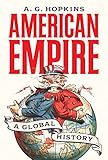American empire : a global history / A. G. Hopkins.
Series: America in the world.Publisher: Princeton ; Oxford : Princeton University Press, 2018Description: xviii, 980 pages : maps, portraits.Content type: text Media type: unmediated Carrier type: volumeISBN: 9780691177052.Subject(s): Globalization -- Political aspects -- History| Item type | Current library | Class number | Status | Barcode | |
|---|---|---|---|---|---|
| Book | House of Lords Library - Palace Dewey | 973 HOP (Browse shelf(Opens below)) | Available | 015221 |
Browsing House of Lords Library - Palace shelves, Shelving location: Dewey Close shelf browser (Hides shelf browser)

|

|

|

|

|

|

|
||
| 973 BRO The Penguin history of the United States of America / | 973 FEN The great American speech : | 973 FLA The history buff's guide to the presidents : | 973 HOP American empire : | 973 KAU The post-presidency from Washington to Clinton / | 973 LEP These truths : | 973 REY America, empire of liberty : a new history / |
Prologue: lessons of liberation: Iraq, 1915–1921 -- Chapter 1. Three crises and an outcome -- Part I. Decolonization and dependence, 1756–1865 -- Chapter 2. The advance and retreat of the military-fiscal state -- Chapter 3. From revolution to constitution -- Chapter 4. The struggle for independence -- Chapter 5. Wars of incorporation -- Part II. Modernity and imperialism, 1865–1914 -- Chapter 6. Uneven development and imperial expansion -- Chapter 7. achieving effective independence -- Chapter 8. Acquiring an unexceptional empire -- Chapter 9. Insular perspectives on an intrusive world – Intermission: Tarzan’s mirror to modernity -- Part III. Empires and international disorder, 1914–1959 -- Chapter 10. The modern imperial system: from conquest to collapse -- Chapter 11. Ruling the forgotten empire -- Chapter 12. Caribbean carnival -- Chapter 13. Paradise in the Pacific -- Chapter 14. “The twilight of confused colonialism” -- Part IV. The outcome: postcolonial globalization -- Chapter 15. Dominance and decline in the postcolonial age -- Epilogue: lessons of liberation: Iraq, 2003–2011.
"American Empire is a panoramic work of scholarship that presents a bold new global perspective on the history of the United States. Drawing on his expertise in economic history and the imperial histories of Britain and Europe, A. G. Hopkins takes readers from the colonial era to today to show how, far from diverging, the United States and Western Europe followed similar trajectories throughout this long period, and how America’s dependency on Britain and Europe extended much later into the nineteenth century than previously understood.
In a sweeping narrative spanning three centuries, Hopkins describes how the revolt of the mainland colonies was the product of a crisis that afflicted the imperial states of Europe generally, and how the history of the American republic between 1783 and 1865 was a response not to the termination of British influence but to its continued expansion. He traces how the creation of a U.S. industrial nation-state after the Civil War paralleled developments in Western Europe, fostered similar destabilizing influences, and found an outlet in imperialism through the acquisition of an insular empire in the Caribbean and Pacific. The period of colonial rule that followed reflected the history of the European empires in its ideological justifications, economic relations, and administrative principles. After 1945, a profound shift in the character of globalization brought the age of the great territorial empires to an end.
American Empire goes beyond the myth of American exceptionalism to place the United States within the wider context of the global historical forces that shaped the Western empires and the world." Taken from dust jacket.
